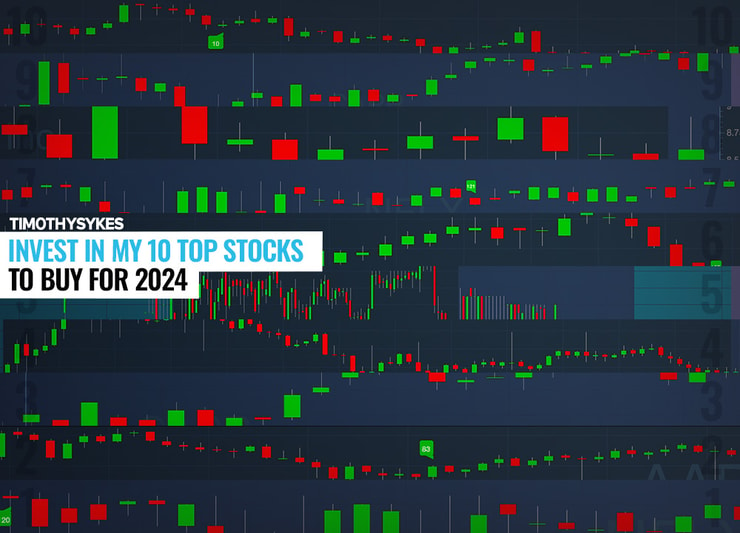Now more than ever, investors are looking for sound financial decisions in a volatile market. Navigating the waters of Wall Street requires expert advice, rigorous research, and reliable information.
For trading purposes, these assets might not be the best place to put your money. They aren’t recommendations — but any stock market players worth their portfolios know that shares in firms of this kind have an outsized presence in the economy.
That includes penny stock traders like me. When the valuation of stocks of note is launching, it’s the perfect hype storm for the stocks I like to trade!
Table of Contents
- 1 Is Now a Good Time to Buy Stocks?
- 2 Criteria in Choosing Top Stocks
- 3 What Are 3 Major Stocks?
- 4 My Top 10 Stocks to Buy This Year (2024) — If You’re an Investor
- 4.1 1. Apple Inc. (NASDAQ: AAPL)
- 4.2 2. Amazon.com Inc. (NASDAQ: AMZN)
- 4.3 3. Walt Disney Co. (NYSE: DIS)
- 4.4 4. PayPal Holdings Inc. (NASDAQ: PYPL)
- 4.5 5. Rexford Industrial Realty (NYSE: REXR)
- 4.6 6. Meta Platforms (NASDAQ: META)
- 4.7 7. HubSpot (NYSE: HUBS)
- 4.8 8. Etsy (NASDAQ: ETSY)
- 4.9 9. Pinterest (NYSE: PINS)
- 4.10 10. Shopify (NYSE: SHOP)
- 5 Final Takeaways for Using Our Stock List
Is Now a Good Time to Buy Stocks?

The question “Is now a good time to buy stocks?” is a persistent one. Some investors may have concerns, given the present volatility of the markets. Economic indicators like interest rates, inflation, and GDP growth all play a part in determining whether it’s a good time to invest or not.
However, many experts opine that timing the market is less important than time in the market. Rather than trying to buy at the lowest point, long-term investors can benefit from buying stocks regularly, regardless of market conditions. Right now, market performance is robust, with significant gains in the Nasdaq and other major indices.
On the other hand, there are risks associated with investing in stocks. Market conditions can change rapidly, and past performance is not indicative of future results. Always consult with a financial advisor before making significant investment decisions.
Criteria in Choosing Top Stocks
When it comes to selecting top stocks, consider these five main factors:
- Strong financial performance history
- Solid growth prospects
- Competitive advantages and market position among consumers, subscribers, and membership
- Caliber of people in management and corporate governance
- Problems and other challenges in economic levels and their own standards and systems
Strong financial performance refers to a company’s track record of delivering consistent earnings, revenue growth, and robust cash flow. These factors often indicate a company’s financial health, which can give investors confidence.
The second factor to consider is the company’s growth prospects. This includes understanding the company’s business model, its place within the industry, and how it plans to grow in the future. Analysts’ estimates and projections can provide useful insights here.
The third criteria, competitive advantage, refers to the unique qualities that give a company an edge over its competitors. This can range from a unique product or service to a strong brand or customer base. Market position also comes into play here, as companies with a dominant market share often have the advantage of economies of scale.
The quality of management and corporate governance are essential. The leadership team should have a proven track record of delivering results and a strategy that aligns with the company’s long-term goals. Corporate governance also plays a crucial role as it ensures the interests of shareholders are protected.
The last criteria include topics that warrant a disclaimer. When restaurants are making losses or offering lots of discounts, stocks in the sector won’t be making new highs. When recession hits, traditional guidance points toward things like defensive stocks. When there’s pressure on China, the volume pouring into Chinese IPOs will suffer.
What Are 3 Major Stocks?

Major stocks are typically those from large, established companies that have a solid track record of stability, reliable returns, and often, regular dividends. The importance of these stocks in a diversified portfolio cannot be overstated. They serve as a financial bedrock, providing balance against the volatility of smaller, riskier investments.
Microsoft, Apple, and Amazon are examples of major stocks. They are part of the trillion-dollar club, companies with market caps exceeding $1 trillion. The performance of these companies can significantly impact indices like the NASDAQ and the S&P 500, given their sheer size and influence. In addition, these stocks are often a mainstay in mutual funds and ETFs.
However, investing in major stocks should not be the only strategy. A diversified portfolio often includes a mix of major stocks, growth stocks, and other asset classes. This diversification can help to manage risk and potentially improve returns over the long term.
While major stocks like Microsoft, Apple, and Amazon are important cornerstones of a diversified portfolio, it’s also crucial to keep an eye on emerging sectors. The tech sector, for instance, is a hotbed of innovation and growth, offering numerous opportunities for savvy traders. If you’re interested in exploring the potential of tech stocks alongside your major stock investments, check out this list of top 6 tech stocks to trade.
My Top 10 Stocks to Buy This Year (2024) — If You’re an Investor
My top 10 investment stocks include:
- Apple Inc. (NASDAQ: AAPL)
- Amazon.com Inc. (NASDAQ: AMZN)
- Walt Disney Co. (NYSE: DIS)
- PayPal Holdings Inc. (NASDAQ: PYPL)
- Rexford Industrial Realty (NYSE: REXR)
- Meta Platforms (NASDAQ: META)
- HubSpot (NYSE: HUBS)
- Etsy (NASDAQ: ETSY)
- Pinterest (NYSE: PINS)
- Shopify (NYSE: SHOP)
This is a watchlist, not a forecast. There’s no guarantee these stocks will offer a trading opportunity or help you hit your trading targets. Keep them on your watchlist, but only trade when you see YOUR best setup.
When there are no truly great trades, use your time to study.
- New to stocks? Start with my FREE online guide here.
- Learn how to build your own stock watchlist here.
- Brush up on your pattern knowledge here.
While the stocks listed here offer promising opportunities, it’s important to remember that the stock market is vast. Consumer discretionary stocks, for instance, can offer lucrative opportunities as they are closely tied to the economy’s health and consumer confidence. If you’re interested in exploring the potential of consumer discretionary stocks, check out this list of top 6 consumer discretionary stocks to watch.
Now, let’s get to the top investments to watch in 2024.
1. Apple Inc. (NASDAQ: AAPL)
Apple continues to impress with its strong product lineup and innovation, robust financials, and promising growth prospects in wearables and services. The company has a consistent track record of delivering impressive earnings, and its dedication to innovation keeps it at the forefront of the tech industry.
2. Amazon.com Inc. (NASDAQ: AMZN)
Amazon’s e-commerce dominance and global expansion, coupled with the growing success of Amazon Web Services (AWS), makes it a top pick for 2024. Its investments in AI and robotics continue to drive its market leadership, and analysts predict robust revenue growth in the coming years.
3. Walt Disney Co. (NYSE: DIS)
Walt Disney’s diverse portfolio of media properties and the success of its streaming services like Disney+ make it a stock to consider. Its theme parks and resorts are also showing a positive recovery trajectory post-pandemic, indicating promising growth potential.
4. PayPal Holdings Inc. (NASDAQ: PYPL)
PayPal is a strong contender in the expanding digital payments market. Its broad range of services and ever-growing global reach, combined with a strong brand and large customer base, make it a potentially profitable pick. The company’s recent earnings reports have shown consistent growth, indicative of its sturdy operations.
5. Rexford Industrial Realty (NYSE: REXR)
Rexford Industrial Realty offers an opportunity to invest in the thriving industrial real estate market. Its solid financials, strategic growth strategy, and potential benefits from e-commerce growth put it on this list of top stocks for 2024. However, like all investments, it’s critical to keep an eye on market trends and adjust your portfolio accordingly.
6. Meta Platforms (NASDAQ: META)
Formerly known as Facebook, Meta Platforms is a leader in social media and is pioneering virtual reality technologies. The company’s monetization of new technologies and long-term growth potential make it an intriguing pick for investors.
7. HubSpot (NYSE: HUBS)
When it comes to comprehensive marketing, sales, and service software, HubSpot stands out. Its steady growth, high customer retention rate, and an ever-expanding suite of product offerings and partnerships make it an enticing stock to consider for 2024. Remember, successful investing is not just about picking winners, but also understanding and managing risk.
8. Etsy (NASDAQ: ETSY)
Etsy, a unique marketplace for handmade and vintage items, offers investors the chance to capitalize on growth potential in niche markets. With a strong community and brand loyalty, Etsy has shown it can attract and retain customers. Like other stocks, it’s subject to market volatility, so stay informed and adapt your strategies as needed.
9. Pinterest (NYSE: PINS)
Pinterest, a visual discovery platform, boasts an engaged user base and promising advertising growth. Its international expansion and the potential for e-commerce integration give it room to increase its market share in the coming years. Keep an eye on its quarterly earnings to assess its financial performance.
10. Shopify (NYSE: SHOP)
Shopify empowers businesses with its e-commerce platform, exhibiting strong growth in merchants and revenue. Its scalable platform with room for expansion makes it a top stock to consider buying this year. Remember to consider all factors, not just growth, when adding new stocks to your portfolio.
Final Takeaways for Using Our Stock List

A diversified portfolio is a key element in sound investing strategy. It’s not just about picking high-growth stocks but also about managing your investment risks. Consider these top stocks for 2024, but don’t overlook index funds, CDs, and ETFs as they can provide balance and stability.
It’s also important to consider the type of stocks you’re investing in. Value stocks can offer stability and potential for long-term growth, making them a valuable addition to any portfolio. If you’re looking to add some value stocks to your portfolio, here’s a comprehensive guide on the best value stocks.
Trading isn’t rocket science. It’s a skill you build and work on like any other. Trading has changed my life, and I think this way of life should be open to more people…
I’ve built my Trading Challenge to pass on the things I had to learn for myself. It’s the kind of community that I wish I had when I was starting out.
We don’t accept everyone. If you’re up for the challenge — I want to hear from you.
Apply to the Trading Challenge here.
Trading is a battlefield. The more knowledge you have, the better prepared you’ll be.
What stocks are in your portfolio for 2024? Let me know in the comments — I love hearing from my readers!





Leave a reply